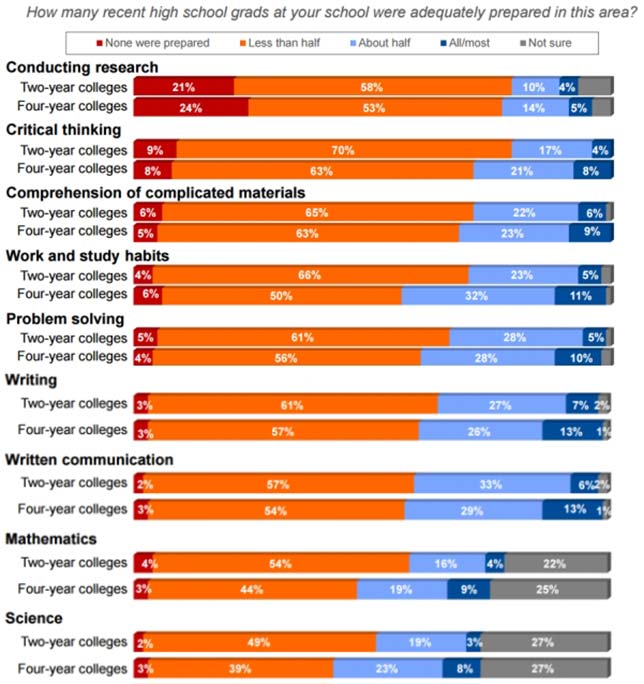Research
Survey: Most Profs Find HS Grads Unready for College or Work
- By Dian Schaffhauser
- 07/27/15
Neither university faculty nor employers believe that American public high schools are preparing students for the expectations they'll face in college and career. In fact, compared to 2004, the assessment is even more dismal. More than a decade ago, for example, only 28 percent of college instructors stated that schools were doing an adequate job of readying students for what came next after high school. That count is down to 14 percent in 2015. Among employers, 49 percent in 2004 said that schools were adequately preparing students for what they would need for work; in 2015, the count was 29 percent. Part of the challenge, say students themselves, is that their high schools don't set academic expectations high enough. Fifty-four percent said that they were only "somewhat challenged"; 20 percent said it was "easy to slide by."
Those findings came out of a recent set of surveys sponsored by Achieve, a national not-for-profit focused on education reform and consisting of state governors and business leaders that led the push for such developments as the PARCC consortium and the Next Generation Science Standards. In April and May the organization queried 767 college instructors, fairly evenly split between those who teach first-year students either in two-year schools or four-year schools, as well as 407 employers involved in hiring and other personnel decisions, divided closely between those who work at firms employing 26 to 100 employees and those employing more. These surveys follow one done last fall that talked to 1,347 recent graduates from the classes of 2011 through 2014 about their sense of preparedness for life after high school. The survey work was performed by Hart Research Associates.
The faculty survey found that in two-year colleges, only 4 percent of instructors found students "most generally able to do what is expected." The number was slightly higher in four-year schools: 12 percent. The rest reported that students had arrived to higher ed with at least some gaps in preparation.
Students had higher opinions of their readiness for college. Of those respondents who were in college, 53 percent said they were "extremely" or "very" well prepared. On the employer side, 18 percent found grads extremely or very well prepared for work. On the other end 17 percent found students "not at all prepared."
High schools do a decent job of preparing students for computers and technology, teamwork and verbal communication. The majority of faculty respondents found them at least adequately prepared in those areas.
However, major gaps showed up in students' preparation in multiple other areas:
- Critical thinking (82 percent of instructors found less than half or none of their students prepared);
- Comprehension of complicated materials (80 percent);
- Work and study habits (78 percent);
- Writing and written communication (77 percent and 76 percent, respectively);
- Problem solving (76 percent);
- Conducting research (74percent);
- Math (59 percent); and
- Science (53 percent).

College instructors report gaps in preparation in these areas. Source: "Rising to the Challenge: College Instructors' Views on High School Graduates' Preparedness for College." Achieve and Hart Research Associates
Also, whereas in 2004 employers found that four out of 10 new hires from high school required additional education or training in reading, writing and math, that count has risen to six in 10 in 2015.
Perhaps the most dramatic finding actually surfaced last year during the student survey. Nearly nine in 10 high school graduates said they would have worked harder if expectations for earning a diploma had been higher.
The survey questioned all respondents about various proposals to improve student preparedness for life after high school.
- Thirty-eight percent of college instructors, 50 percent of employers and 56 percent of recent graduates believe that students would be better prepared for college and career if they were to learn earlier in high school about what courses they'll need to pursue their academic and career aspirations.
- Providing opportunities for "real-world learning" would improve things a "great deal" according to 33 percent of college instructors, 57 percent of employers and 63 percent of students.
- The idea of requiring students to pass exams in math and writing in order to graduate received mild disapproval, with just 32 percent of instructors, 44 percent of employers and 36 percent of students gravitating toward that proposal.
- What was slightly better received among students was a suggestion that they have the opportunity to take challenging courses, such as honors or advanced placement classes. Half of students saw that proposal as having potential.
"We know that our schools can do a better job of preparing students for success in their next steps," said Michael Cohen, president of Achieve. "We hear students saying that they are certain they would have worked harder in high school if they'd been held to higher expectations. It's critical that schools clearly communicate the expectations of colleges and employers early in a student's high school experience and help them to understand the coursework they will need to complete. When we set rigorous expectations, students can and will rise to the challenge."
The survey results are shared in PowerPoint slides on this Achieve site. The November 2014 student survey results are on this page.

